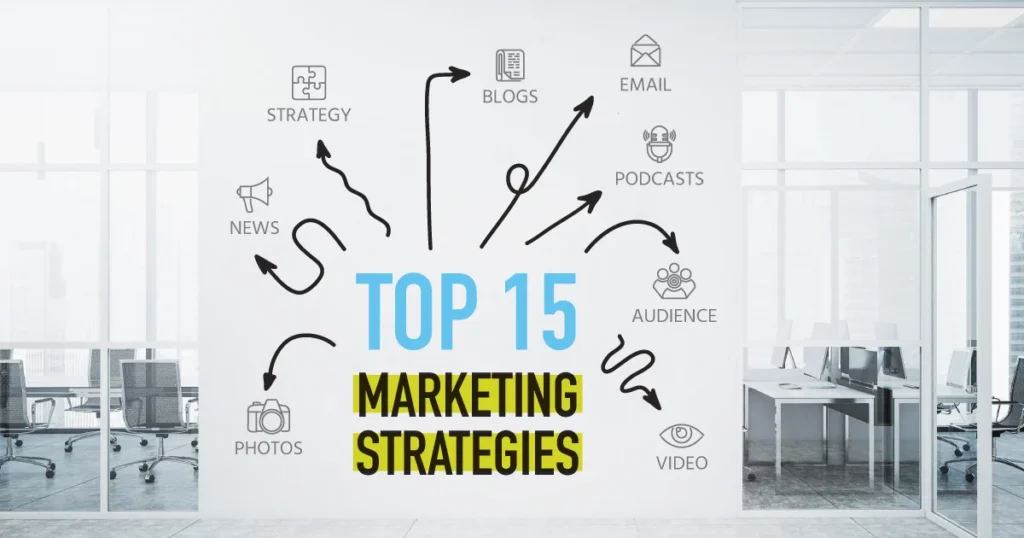Social media has become an indispensable part of marketing strategies for B2B businesses. It offers a platform to connect with target audiences, build brand awareness, and generate leads. However, succeeding in social media marketing requires a well-planned strategy tailored specifically for the B2B landscape. In this blog post, we will explore 15 valuable social media marketing tips to help B2B businesses thrive in the digital space. By implementing these strategies, you can optimize your social media presence and achieve meaningful results for your B2B organization.

- Define Your Goals and Objectives
Before diving into social media marketing, establish clear goals and objectives. Determine what you want to achieve, such as increasing brand awareness, generating leads, or driving website traffic. Aligning your social media efforts with specific goals will guide your strategy and enable you to measure success effectively.
- Understand Your Target Audience
To create engaging and relevant content, you must have a deep understanding of your target audience. Research their pain points, interests, and demographics. Use this information to develop content that resonates with their needs and preferences, positioning your brand as a valuable resource.
- Select the Right Social Media Platforms
Not all social media platforms are equally effective for B2B businesses. Identify the platforms that align with your target audience and industry. LinkedIn is a primary platform for B2B marketing, offering professional networking opportunities. Additionally, consider platforms like Twitter, Facebook, and YouTube based on your audience’s preferences and content type.
- Optimize Your Social Media Profiles
Optimize your social media profiles to maximize visibility and create a strong brand impression. Use relevant keywords, compelling descriptions, and high-quality visuals that reflect your brand identity. Ensure consistency across platforms to maintain a cohesive brand image.
- Share Valuable and Educational Content
Create and share valuable content that educates and informs your target audience. Develop blog posts, whitepapers, eBooks, or case studies that address industry challenges and offer solutions. Use visuals, videos, and infographics to enhance engagement and shareability.
- Leverage User-Generated Content
Encourage your audience to generate content related to your brand. User-generated content acts as social proof and strengthens your credibility. Share customer testimonials, success stories, and user-generated visuals to foster trust and engage your audience.
- Establish Thought Leadership
Position yourself as a thought leader in your industry by sharing insightful content and contributing to relevant conversations. Write authoritative blog posts, participate in industry forums, and join LinkedIn groups to showcase your expertise and engage with industry professionals.
- Incorporate Visual Content
Visual content is highly engaging and easily shareable. Use visually appealing images, infographics, and videos to capture your audience’s attention. Visuals are particularly effective in conveying complex B2B information in a digestible format.
- Engage and Interact with Your Audience
Social media is a two-way communication channel. Engage with your audience by responding to comments, messages, and mentions promptly and professionally. Encourage conversations, ask questions, and foster a sense of community to build stronger relationships with your followers.
- Utilize LinkedIn Groups and Communities
LinkedIn Groups and communities provide valuable networking opportunities. Join industry-specific groups and actively participate in discussions, sharing insights and expertise. This engagement helps establish your brand as a trusted resource within your niche.
- Use Targeted Advertising
Leverage social media advertising to reach your target audience effectively. Use precise targeting options available on platforms like LinkedIn, Facebook, and Twitter to narrow down your audience based on demographics, job titles, and industry. Craft compelling ad copy and visuals to drive conversions.
- Collaborate with Influencers
Identify industry influencers and thought leaders who align with your brand values and target audience. Collaborate with them on content creation, webinars, or guest blogging opportunities. Partnering with influencers can expand your reach and enhance your brand’s credibility.
- Monitor Analytics and Refine Your Strategy
Regularly monitor social media analytics to measure the effectiveness of your efforts. Track metrics such as engagement, reach, conversion rates, and website traffic. Use these insights to refine your strategy, identify successful tactics, and make data-driven decisions.
- Incorporate Social Media Listening
Implement social media listening tools to monitor industry trends, conversations, and sentiment around your brand. Gain valuable insights into customer needs, pain points, and emerging trends. This information can guide your content strategy and help you stay ahead of the competition.
- Test and Experiment
Social media is ever-evolving, so don’t be afraid to test new strategies and experiment with different content formats. Analyze the results and optimize based on data-driven insights. This iterative approach will help you refine your social media marketing tactics and maximize results over time.
Implementing these 15 social media marketing tips tailored for B2B businesses can significantly impact your brand’s visibility, engagement, and lead generation. By defining your goals, understanding your target audience, utilizing the right platforms, and creating valuable content, you can establish your brand as an authority in your industry. Engage with your audience, leverage social media advertising, collaborate with influencers, and continuously monitor analytics to refine your strategy. With consistent effort and a focus on delivering value, your B2B business can leverage the power of social media to drive meaningful results and achieve your marketing objectives.